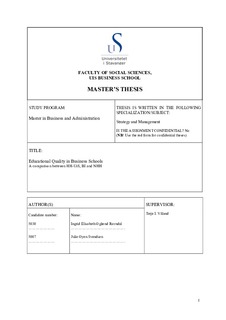| dc.description.abstract | In recent times, educational quality in higher education has once again been brought up and discussed, and several areas for improvement have been recognized. Also, the question of whether differences between educational institutions may possibly affect this quality has been raised. The purpose of this thesis is to shed some light on these differences, and to see if characteristics and resources within the educational institution can be a part of the explanation. We do so by comparing HH-UiS, BI and NHH. Based on this, we aim to answer the following research question:
“What characterizes educational quality in Business schools?”
Through a collection of secondary data on the subject, we gained insight into educational quality as both input, process and output. In other words, we looked at quality as a ‘trinity’. It can be explained by input – features of the school and students that are accepted, process – how students enrolled in the program view their education, and output – how candidates experience their benefit and situation after completing studies.
The empirical evidence consists of several sources of secondary data. The data retrieved for this thesis have, along with existing theory on the subject, created the foundation from which we will be able to answer our overall research questions and its three related, underlying questions that will help illuminate the issue.
This thesis has revealed strong indications that both the resource base and characteristics of the program within a Business School will have an effect on how students and candidates assess the quality of the institution where they are currently studying, or have graduated from. However, the magnitude of the effect varies from school to school. Generally, high values of publication points per FTE and students per FTE have a negative effect on how students and candidates assess quality. On the other hand, high admission, higher numbers of specializations and the possibility of internships have a positive effect. Additionally, this thesis reveals indications of possible gaps between students’ perception and candidates’ experience when it comes to work relevance and learning outcome. Also, there is an existing gap between work-integrated learning and unemployment. | nb_NO |
